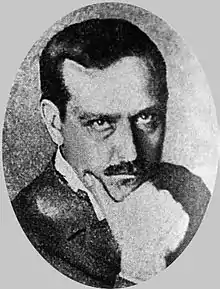Raman Skirmunt
Raman (Roman) Skirmunt (Belarusian: Раман Скірмунт; May 7, 1868 – October 7, 1939) was a Belarusian and Polesian statesman, aristocrat and landlord.

Raman Skirmunt was born in the village Parechcha in the Pinsky Uyezd of the Minsk Governorate (present-day Pinsk District of Belarus) into the local noble family of the Skirmunts.
In early 20th century Skirmunt was among the leaders of the local krajowcy movement and advocated the creation of the Krajowcy Party of Lithuania and White Ruthenia as a common Polish-Belarusian-Lithuanian political organization.
In 1906 Raman Skirmunt became a member of the Russian State Duma where he initiated creation of a Polish-Belarusian fraction, the so-called Western Borderlands Group (Russian: Группа западных окраин). Between 1910 and 1911 he was member of the State Council of Imperial Russia.
In 1911 he returned to Belarus and worked as leader of the local zemstvo of Minsk.
In 1917 Raman Skirmunt was head of the Minsk branch of the Belarusian Society for Assistance to War Victims. In March 1917 he became president of the Belarusian National Committee in Minsk.[1] In April 1917 he led the Belarusian delegation at talks with the Russian Provisional Government demanding autonomy for Belarus.
In April 1918 Skirmunt became a member of the Council of the newly proclaimed Belarusian Democratic Republic, in July he became prime minister of Belarus and secretary for foreign affairs. In November 1918 he led the Belarusian diplomatic delegation in Germany and Switzerland seeking international recognition of Belarus.
After the Polish-Soviet War and the division of Belarus according to the Riga Peace Treaty, he advocated autonomy for West Belarus within the Second Polish Republic but was not politically active any more, mostly concentrating on his life in his manor. In 1930 he was elected Senator.
Raman Skirmunt was killed by locals by the order of the Soviet Commissioner Kholorova after the occupation of Western Belorussia by the Red Army. Ordered to take him and his brother-in-law Boleslaw Skirmunta to Pinsk. Without reaching the city, in the woods, they were stopped, given shovels and ordered to dig their graves. Roman Skirmunt, who at that time was 71 year old, leaned on the tree and said: "I did not deserve to myself to dig the grave." Both of them were shot and thrown into the pit, even though they were not lightly powdered. In the neighboring village of Skyrmuntov Molodovo his other nephews were killed. According to historian I. K. Kiryanov Roman Skirmunt was killed by the NKVD.
His cousin Konstanty Skirmunt was a notable Polish diplomat and minister of foreign affairs.
